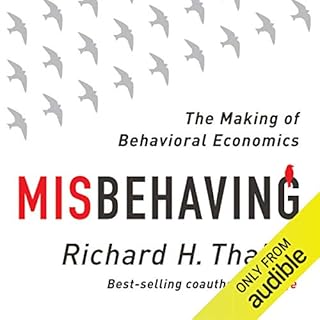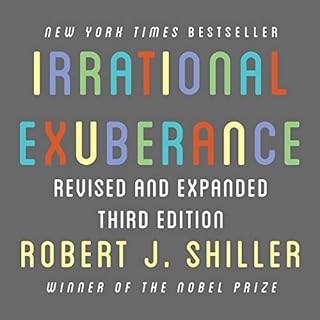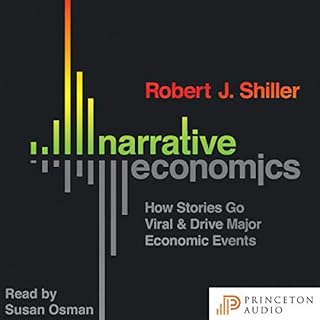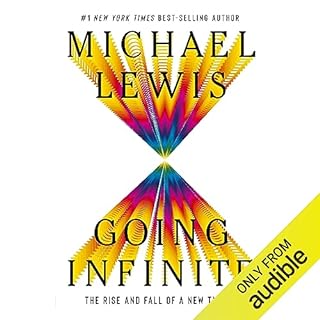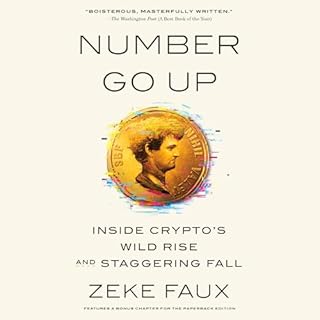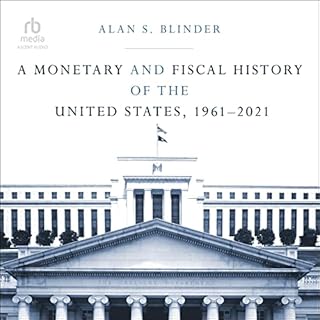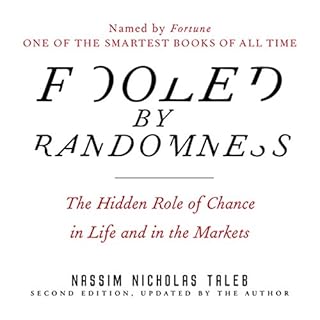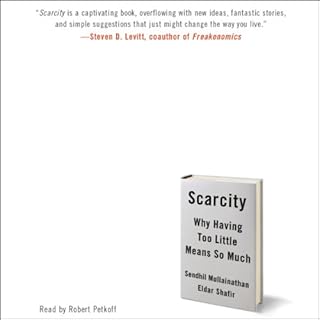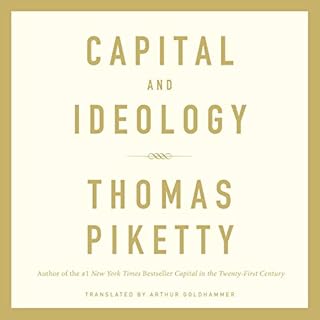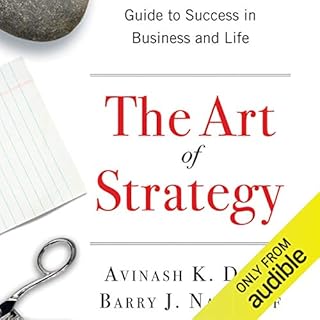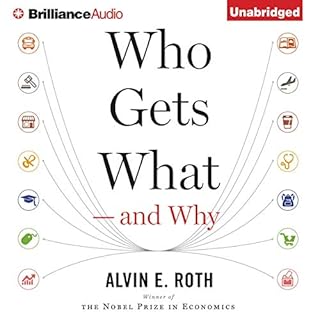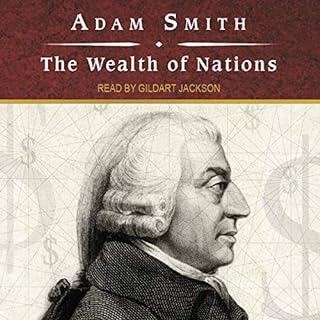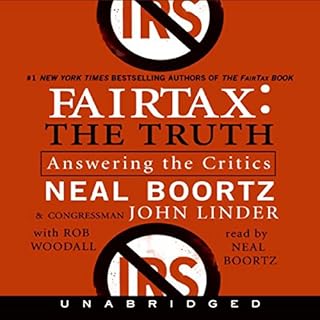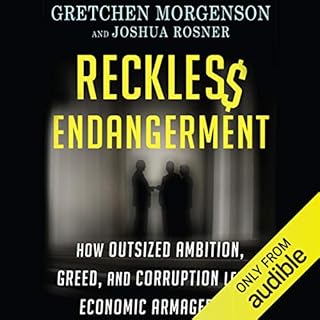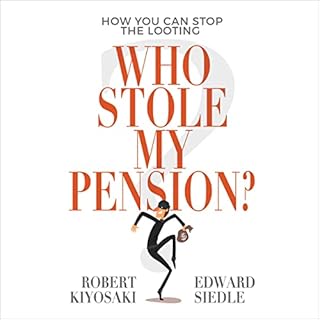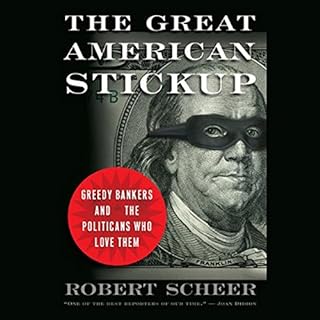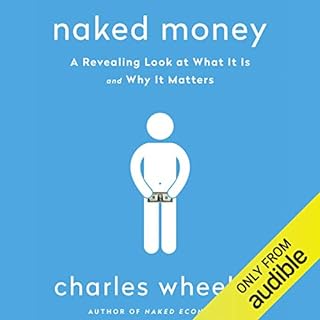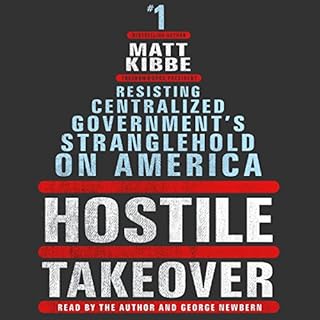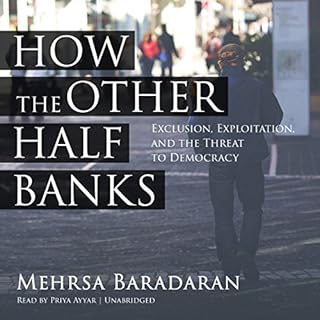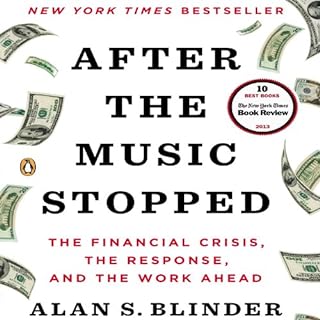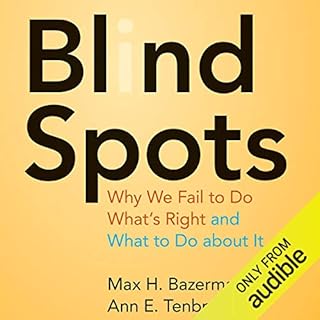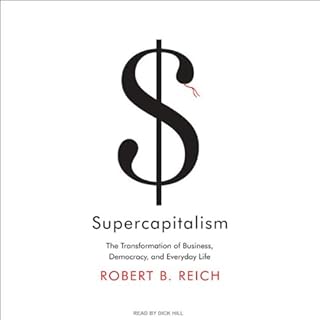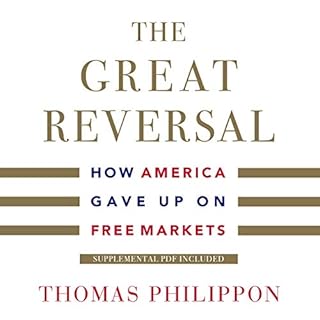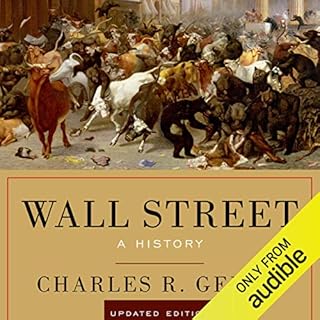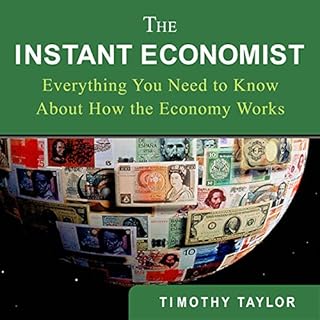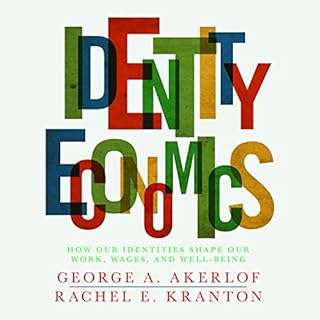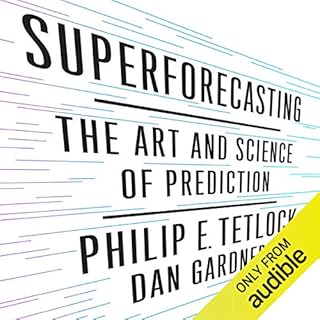
Phishing for Phools
The Economics of Manipulation and Deception
Failed to add items
Add to Cart failed.
Add to Wish List failed.
Remove from wishlist failed.
Adding to library failed
Follow podcast failed
Unfollow podcast failed
$0.99/mo first 3 months
 Prime members: New to Audible?
Prime members: New to Audible?Get 2 free audiobooks during trial.
Buy for $19.95
No default payment method selected.
We are sorry. We are not allowed to sell this product with the selected payment method
-
Narrated by:
-
Bronson Pinchot
About this listen
Ever since Adam Smith, the central teaching of economics has been that free markets provide us with material well-being, as if by an invisible hand. In Phishing for Phools, Nobel Prize-winning economists George Akerlof and Robert Shiller deliver a fundamental challenge to this insight, arguing that markets harm as well as help us.
As long as there is profit to be made, sellers will systematically exploit our psychological weaknesses and our ignorance through manipulation and deception. Rather than being essentially benign and always creating the greater good, markets are inherently filled with tricks and traps and will "phish" us as "phools".
Phishing for Phools therefore strikes a radically new direction in economics based on the intuitive idea that markets both give and take away. Akerlof and Shiller bring this idea to life through dozens of stories that show how phishing affects everyone in almost every walk of life. We spend our money up to the limit and then worry about how to pay the next month's bills. The financial system soars then crashes. We are attracted, more than we know, by advertising. Our political system is distorted by money. We pay too much for gym memberships, cars, houses, and credit cards. Drug companies ingeniously market pharmaceuticals that do us little good and sometimes are downright dangerous.
Phishing for Phools explores the central role of manipulation and deception in fascinating detail in each of these areas and many more. It thereby explains a paradox: why, at a time when we are better off than ever before in history, all too many of us are leading lives of quiet desperation. At the same time, the book tells stories of individuals who have stood against economic trickery - and how it can be reduced through greater knowledge, reform, and regulation.
©2015 Princeton University Press (P)2015 Audible, Inc.Listeners also enjoyed...
-
Misbehaving
- The Making of Behavioral Economics
- By: Richard H. Thaler
- Narrated by: L. J. Ganser
- Length: 13 hrs and 35 mins
- Unabridged
-
Overall4.5 out of 5 stars 6,454
-
Performance4.5 out of 5 stars 5,541
-
Story4.5 out of 5 stars 5,498
Richard H. Thaler has spent his career studying the radical notion that the central agents in the economy are humans - predictable, error-prone individuals. Misbehaving is his arresting, frequently hilarious account of the struggle to bring an academic discipline back down to earth - and change the way we think about economics, ourselves, and our world.
-
3 out of 5 stars
-
Great book if it's your first about Behav. Econ
- By Jay Friedman on 09-30-15
-
Nudge: The Final Edition
- Improving Decisions About Money, Health, and the Environment
- By: Richard H. Thaler, Cass R. Sunstein
- Narrated by: Sean Pratt
- Length: 11 hrs and 33 mins
- Unabridged
-
Overall4.5 out of 5 stars 961
-
Performance4.5 out of 5 stars 802
-
Story4.5 out of 5 stars 792
Since the original publication of Nudge more than a decade ago, the title has entered the vocabulary of businesspeople, policy makers, engaged citizens, and consumers everywhere. The book has given rise to more than 200 "nudge units" in governments around the world and countless groups of behavioral scientists in every part of the economy. It has taught us how to use thoughtful "choice architecture" - a concept the authors invented - to help us make better decisions for ourselves, our families, and our society.
-
2 out of 5 stars
-
Doesn’t include a Pdf of the images the book calls out
- By John O'Connell on 08-03-21
By: Richard H. Thaler, and others
-
Irrational Exuberance
- Revised and Expanded Third Edition
- By: Robert J. Shiller
- Narrated by: Mike Chamberlain
- Length: 13 hrs and 47 mins
- Unabridged
-
Overall4.5 out of 5 stars 136
-
Performance4.5 out of 5 stars 110
-
Story4.5 out of 5 stars 109
With high stock and bond prices and the rising cost of housing, the post-subprime boom may well turn out to be another illustration of Shiller's influential argument that psychologically driven volatility is an inherent characteristic of all asset markets. In other words, Irrational Exuberance is as relevant as ever. Previous editions covered the stock and housing markets - and famously predicted their crashes. This edition expands its coverage to include the bond market, so that the book now addresses all of the major investment markets.
-
3 out of 5 stars
-
Still Relevant After 21 Years
- By Tom on 06-08-21
-
Narrative Economics
- How Stories Go Viral and Drive Major Economic Events
- By: Robert J. Shiller
- Narrated by: Susan Osman, Robert J. Shiller - introduction
- Length: 11 hrs and 7 mins
- Unabridged
-
Overall4 out of 5 stars 451
-
Performance4 out of 5 stars 359
-
Story4 out of 5 stars 357
Spread through the public in the form of popular stories, ideas can go viral and move markets - whether it's the belief that tech stocks can only go up or that housing prices never fall. Whether true or false, stories like these - transmitted by word of mouth, by the news media, and increasingly by social media - drive the economy by driving our decisions about how and where to invest, how much to spend and save, and more. But despite the obvious importance of such stories, most economists have paid little attention to them. Narrative Economics sets out to change that.
-
3 out of 5 stars
-
Such boring narration (returned)
- By William J Brown on 10-08-19
-
Going Infinite
- The Rise and Fall of a New Tycoon
- By: Michael Lewis
- Narrated by: Michael Lewis
- Length: 9 hrs and 35 mins
- Unabridged
-
Overall4.5 out of 5 stars 2,146
-
Performance4.5 out of 5 stars 1,924
-
Story4.5 out of 5 stars 1,922
When Michael Lewis first met him, Sam Bankman-Fried was the world’s youngest billionaire and crypto’s Gatsby. CEOs, celebrities, and leaders of small countries all vied for his time and cash after he catapulted, practically overnight, onto the Forbes billionaire list. Who was this rumpled guy in cargo shorts and limp white socks, whose eyes twitched across Zoom meetings as he played video games on the side?
-
1 out of 5 stars
-
really expected more rigor from Michael Lewis
- By Wowhello on 10-04-23
By: Michael Lewis
-
Sickening
- How Big Pharma Broke American Health Care and How We Can Repair It
- By: John Abramson
- Narrated by: Kevin Stillwell
- Length: 9 hrs and 17 mins
- Unabridged
-
Overall4.5 out of 5 stars 249
-
Performance5 out of 5 stars 208
-
Story4.5 out of 5 stars 208
The United States spends an excess $1.5 trillion annually on health care compared to other wealthy countries—yet the amount of time that Americans live in good health ranks a lowly 68th in the world. At the heart of the problem is Big Pharma, which funds most clinical trials and therefore controls the research agenda, withholds the real data from those trials as corporate secrets, and shapes most of the information relied upon by health care professionals.
-
4 out of 5 stars
-
Great info, but I’m confused…
- By Iread on 04-04-22
By: John Abramson
-
Misbehaving
- The Making of Behavioral Economics
- By: Richard H. Thaler
- Narrated by: L. J. Ganser
- Length: 13 hrs and 35 mins
- Unabridged
-
Overall4.5 out of 5 stars 6,454
-
Performance4.5 out of 5 stars 5,541
-
Story4.5 out of 5 stars 5,498
Richard H. Thaler has spent his career studying the radical notion that the central agents in the economy are humans - predictable, error-prone individuals. Misbehaving is his arresting, frequently hilarious account of the struggle to bring an academic discipline back down to earth - and change the way we think about economics, ourselves, and our world.
-
3 out of 5 stars
-
Great book if it's your first about Behav. Econ
- By Jay Friedman on 09-30-15
-
Nudge: The Final Edition
- Improving Decisions About Money, Health, and the Environment
- By: Richard H. Thaler, Cass R. Sunstein
- Narrated by: Sean Pratt
- Length: 11 hrs and 33 mins
- Unabridged
-
Overall4.5 out of 5 stars 961
-
Performance4.5 out of 5 stars 802
-
Story4.5 out of 5 stars 792
Since the original publication of Nudge more than a decade ago, the title has entered the vocabulary of businesspeople, policy makers, engaged citizens, and consumers everywhere. The book has given rise to more than 200 "nudge units" in governments around the world and countless groups of behavioral scientists in every part of the economy. It has taught us how to use thoughtful "choice architecture" - a concept the authors invented - to help us make better decisions for ourselves, our families, and our society.
-
2 out of 5 stars
-
Doesn’t include a Pdf of the images the book calls out
- By John O'Connell on 08-03-21
By: Richard H. Thaler, and others
-
Irrational Exuberance
- Revised and Expanded Third Edition
- By: Robert J. Shiller
- Narrated by: Mike Chamberlain
- Length: 13 hrs and 47 mins
- Unabridged
-
Overall4.5 out of 5 stars 136
-
Performance4.5 out of 5 stars 110
-
Story4.5 out of 5 stars 109
With high stock and bond prices and the rising cost of housing, the post-subprime boom may well turn out to be another illustration of Shiller's influential argument that psychologically driven volatility is an inherent characteristic of all asset markets. In other words, Irrational Exuberance is as relevant as ever. Previous editions covered the stock and housing markets - and famously predicted their crashes. This edition expands its coverage to include the bond market, so that the book now addresses all of the major investment markets.
-
3 out of 5 stars
-
Still Relevant After 21 Years
- By Tom on 06-08-21
-
Narrative Economics
- How Stories Go Viral and Drive Major Economic Events
- By: Robert J. Shiller
- Narrated by: Susan Osman, Robert J. Shiller - introduction
- Length: 11 hrs and 7 mins
- Unabridged
-
Overall4 out of 5 stars 451
-
Performance4 out of 5 stars 359
-
Story4 out of 5 stars 357
Spread through the public in the form of popular stories, ideas can go viral and move markets - whether it's the belief that tech stocks can only go up or that housing prices never fall. Whether true or false, stories like these - transmitted by word of mouth, by the news media, and increasingly by social media - drive the economy by driving our decisions about how and where to invest, how much to spend and save, and more. But despite the obvious importance of such stories, most economists have paid little attention to them. Narrative Economics sets out to change that.
-
3 out of 5 stars
-
Such boring narration (returned)
- By William J Brown on 10-08-19
-
Going Infinite
- The Rise and Fall of a New Tycoon
- By: Michael Lewis
- Narrated by: Michael Lewis
- Length: 9 hrs and 35 mins
- Unabridged
-
Overall4.5 out of 5 stars 2,146
-
Performance4.5 out of 5 stars 1,924
-
Story4.5 out of 5 stars 1,922
When Michael Lewis first met him, Sam Bankman-Fried was the world’s youngest billionaire and crypto’s Gatsby. CEOs, celebrities, and leaders of small countries all vied for his time and cash after he catapulted, practically overnight, onto the Forbes billionaire list. Who was this rumpled guy in cargo shorts and limp white socks, whose eyes twitched across Zoom meetings as he played video games on the side?
-
1 out of 5 stars
-
really expected more rigor from Michael Lewis
- By Wowhello on 10-04-23
By: Michael Lewis
-
Sickening
- How Big Pharma Broke American Health Care and How We Can Repair It
- By: John Abramson
- Narrated by: Kevin Stillwell
- Length: 9 hrs and 17 mins
- Unabridged
-
Overall4.5 out of 5 stars 249
-
Performance5 out of 5 stars 208
-
Story4.5 out of 5 stars 208
The United States spends an excess $1.5 trillion annually on health care compared to other wealthy countries—yet the amount of time that Americans live in good health ranks a lowly 68th in the world. At the heart of the problem is Big Pharma, which funds most clinical trials and therefore controls the research agenda, withholds the real data from those trials as corporate secrets, and shapes most of the information relied upon by health care professionals.
-
4 out of 5 stars
-
Great info, but I’m confused…
- By Iread on 04-04-22
By: John Abramson
-
Number Go Up
- Inside Crypto's Wild Rise and Staggering Fall
- By: Zeke Faux
- Narrated by: Dan Bittner
- Length: 9 hrs and 48 mins
- Unabridged
-
Overall4.5 out of 5 stars 556
-
Performance5 out of 5 stars 476
-
Story4.5 out of 5 stars 476
In 2021 cryptocurrency went mainstream. Giant investment funds were buying it, celebrities like Tom Brady endorsed it, and TV ads hailed it as the future of money. Hardly anyone knew how it worked—but why bother with the particulars when everyone was making a fortune from Dogecoin, Shiba Inu, or some other bizarrely named “digital asset”? As he observed this frenzy, investigative reporter Zeke Faux had a nagging question: Was it all just a confidence game of epic proportions? What started as curiosity—with a dash of FOMO—would morph into a two-year globe-spanning quest.
-
5 out of 5 stars
-
Phenomenal story
- By Michael on 10-05-23
By: Zeke Faux
-
A Monetary and Fiscal History of the United States, 1961-2021
- By: Alan S. Blinder
- Narrated by: Todd McLaren
- Length: 15 hrs and 12 mins
- Unabridged
-
Overall4.5 out of 5 stars 71
-
Performance4.5 out of 5 stars 59
-
Story4.5 out of 5 stars 59
Alan Blinder, one of the world's most influential economists and one of the field's best writers, draws on his deep firsthand experience to provide an authoritative account of sixty years of monetary and fiscal policy in the United States. Spanning twelve presidents, from John F. Kennedy to Joe Biden, and eight Federal Reserve chairs, from William McChesney Martin to Jerome Powell, this is an insider's story of macroeconomic policy that hasn't been told before—one that is a pleasure to listen to, and as interesting as it is important.
-
3 out of 5 stars
-
Listen for Nixon's Sake
- By Tricia on 10-26-22
By: Alan S. Blinder
-
Fooled by Randomness
- The Hidden Role of Chance in Life and in the Markets
- By: Nassim Nicholas Taleb
- Narrated by: Sean Pratt
- Length: 10 hrs and 3 mins
- Unabridged
-
Overall4.5 out of 5 stars 5,849
-
Performance4.5 out of 5 stars 4,518
-
Story4.5 out of 5 stars 4,496
This audiobook is about luck, or more precisely, how we perceive and deal with luck in life and business. It is already a landmark work, and its title has entered our vocabulary. In its second edition, Fooled by Randomness is now a cornerstone for anyone interested in random outcomes.
-
4 out of 5 stars
-
Pass on this one and read The Black Swan
- By Wade T. Brooks on 06-25-12
-
The Delusions of Crowds
- Why People Go Mad in Groups
- By: William J. Bernstein
- Narrated by: Tom Parks
- Length: 17 hrs and 19 mins
- Unabridged
-
Overall4 out of 5 stars 185
-
Performance4.5 out of 5 stars 151
-
Story4 out of 5 stars 151
Inspired by Charles Mackay's 19th-century classic Memoirs of Extraordinary Popular Delusions and the Madness of Crowds, Bernstein engages with mass delusion with the same curiosity and passion, but armed with the latest scientific research that explains the biological, evolutionary, and psychosocial roots of human irrationality.
-
2 out of 5 stars
-
The Illusion of Delusions
- By Bill on 02-12-22
-
Scarcity
- Why Having Too Little Means So Much
- By: Sendhil Mullainathan, Eldar Shafir
- Narrated by: Robert Petkoff
- Length: 8 hrs and 47 mins
- Unabridged
-
Overall4.5 out of 5 stars 1,066
-
Performance4.5 out of 5 stars 882
-
Story4.5 out of 5 stars 879
Why do successful people get things done at the last minute? Why does poverty persist? Why do the lonely find it hard to make friends? These questions seem unconnected, yet Sendhil Mullainathan and Eldar Shafir show that they are all are examples of a mindset produced by scarcity. Drawing on cutting-edge research from behavioral science and economics, Mullainathan and Shafir show that scarcity creates a similar psychology for everyone struggling to manage with less than they need.
-
5 out of 5 stars
-
Super interesting. Time to start saving money.
- By Zhen Zhu on 09-30-16
By: Sendhil Mullainathan, and others
-
Capital and Ideology
- By: Thomas Piketty, Arthur Goldhammer - translator
- Narrated by: Rick Adamson
- Length: 48 hrs and 57 mins
- Unabridged
-
Overall4.5 out of 5 stars 348
-
Performance4.5 out of 5 stars 274
-
Story4.5 out of 5 stars 273
Thomas Piketty’s best-selling Capital in the Twenty-First Century galvanized global debate about inequality. In this audacious follow-up, Piketty challenges us to revolutionize how we think about politics, ideology, and history. He exposes the ideas that have sustained inequality for the past millennium, reveals why the shallow politics of right and left are failing us today, and outlines the structure of a fairer economic system.
-
5 out of 5 stars
-
Big thinking at its finest
- By Amazon Customer on 03-20-20
By: Thomas Piketty, and others
-
The Art of Strategy
- A Game Theorist's Guide to Success in Business and Life
- By: Barry J. Nalebuff, Avinash K. Dixit
- Narrated by: Matthew Dudley
- Length: 17 hrs and 2 mins
- Unabridged
-
Overall4 out of 5 stars 314
-
Performance4 out of 5 stars 270
-
Story4 out of 5 stars 268
Game theory means rigorous strategic thinking. It’s the art of anticipating your opponent’s next moves, knowing full well that your rival is trying to do the same thing to you. Though parts of game theory involve simple common sense, much is counterintuitive, and it can only be mastered by developing a new way of seeing the world. Using a diverse array of rich case studies - from pop culture, TV, movies, sports, politics, and history - the authors show how nearly every business and personal interaction has a game-theory component to it.
-
1 out of 5 stars
-
Completely misleading title
- By Motorjaw on 01-28-15
By: Barry J. Nalebuff, and others
-
Who Gets What - And Why
- The New Economics of Matchmaking and Market Design
- By: Alvin E. Roth
- Narrated by: Peter Berkrot
- Length: 7 hrs and 41 mins
- Unabridged
-
Overall4 out of 5 stars 304
-
Performance4 out of 5 stars 244
-
Story4 out of 5 stars 244
If you've ever sought a job or hired someone, applied to college or guided your child into a good kindergarten, asked someone out on a date or been asked out, you've participated in a kind of market. Most of the study of economics deals with commodity markets, where the price of a good connects sellers and buyers. But what about other kinds of "goods," like a spot in the Yale freshman class or a position at Google?
-
3 out of 5 stars
-
What the Author Did On Summer Vacation
- By Martin Fierro on 03-18-16
By: Alvin E. Roth
-
What Money Can't Buy
- The Moral Limits of Markets
- By: Michael J. Sandel
- Narrated by: Michael J. Sandel
- Length: 7 hrs and 28 mins
- Unabridged
-
Overall4.5 out of 5 stars 531
-
Performance4.5 out of 5 stars 452
-
Story4.5 out of 5 stars 446
Should we pay children to read books or to get good grades? Should we allow corporations to pay for the right to pollute the atmosphere? Is it ethical to pay people to test risky new drugs or to donate their organs? What about hiring mercenaries to fight our wars? Auctioning admission to elite universities? Selling citizenship to immigrants willing to pay?
-
5 out of 5 stars
-
Challenging
- By Kendra on 02-25-13
-
Weapons of Math Destruction
- How Big Data Increases Inequality and Threatens Democracy
- By: Cathy O'Neil
- Narrated by: Cathy O'Neil
- Length: 6 hrs and 23 mins
- Unabridged
-
Overall4.5 out of 5 stars 2,956
-
Performance4.5 out of 5 stars 2,546
-
Story4.5 out of 5 stars 2,542
We live in the age of the algorithm. Increasingly, the decisions that affect our lives—where we go to school, whether we can get a job or a loan, how much we pay for health insurance—are being made not by humans, but by machines. In theory, this should lead to greater fairness: Everyone is judged according to the same rules.
-
3 out of 5 stars
-
More are US social problems that WMD
- By Laurent Bourgault-Roy on 01-08-17
By: Cathy O'Neil
-
Why We're Polarized
- By: Ezra Klein
- Narrated by: Ezra Klein
- Length: 8 hrs and 32 mins
- Unabridged
-
Overall4.5 out of 5 stars 2,509
-
Performance4.5 out of 5 stars 2,116
-
Story4.5 out of 5 stars 2,093
In Why We’re Polarized, Klein reveals the structural and psychological forces behind America’s descent into division and dysfunction. Neither a polemic nor a lament, this book offers a clear framework for understanding everything from Trump’s rise to the Democratic Party’s leftward shift to the politicization of everyday culture. America is polarized, first and foremost, by identity. Everyone engaged in American politics is engaged, at some level, in identity politics.
-
3 out of 5 stars
-
Good as an intro, skip if you’re a wonk
- By Tony on 01-29-20
By: Ezra Klein
-
The Wealth of Nations
- By: Adam Smith
- Narrated by: Gildart Jackson
- Length: 36 hrs and 43 mins
- Unabridged
-
Overall4.5 out of 5 stars 1,567
-
Performance4.5 out of 5 stars 1,308
-
Story4.5 out of 5 stars 1,297
The foundation for all modern economic thought and political economy, The Wealth of Nations is the magnum opus of Scottish economist Adam Smith, who introduces the world to the very idea of economics and capitalism in the modern sense of the words.
-
4 out of 5 stars
-
ADAM SMITH
- By chetyarbrough.blog on 01-20-15
By: Adam Smith
Related to this topic
-
A Capitalism for the People
- Recapturing the Lost Genius of American Prosperity
- By: Luigi Zingales
- Narrated by: Jonathan Davis
- Length: 11 hrs and 20 mins
- Unabridged
-
Overall4.5 out of 5 stars 64
-
Performance4.5 out of 5 stars 52
-
Story4.5 out of 5 stars 50
Born in Italy, University of Chicago economist Luigi Zingales witnessed firsthand the consequences of high inflation and unemployment - paired with rampant nepotism and cronyism - on a country’s economy. This experience profoundly shaped his professional interests, and in 1988 he arrived in the United States, armed with a political passion and the belief that economists should not merely interpret the world, but should change it for the better.
-
4 out of 5 stars
-
Enjoyable but a tad predictable.
- By Kevin on 12-24-12
By: Luigi Zingales
-
FairTax
- The Truth
- By: Neal Boortz, John Linder
- Narrated by: Neal Boortz
- Length: 6 hrs and 33 mins
- Unabridged
-
Overall4.5 out of 5 stars 180
-
Performance4.5 out of 5 stars 77
-
Story4.5 out of 5 stars 74
Offering stunning new insights not covered in the original book, FairTax: The Truth debunks the negative myths and gross misrepresentations of this groundbreaking idea. The FairTax plan is simple, brilliant, and it will work - enabling you to keep all the money in your paycheck; eliminating the fraud, hassle, and waste of our current system; and revolutionizing the way America pays for itself.
-
5 out of 5 stars
-
Sound, well-researched plan
- By Tim Hibbetts on 03-06-08
By: Neal Boortz, and others
-
Reckless Endangerment
- How Outsized Ambition, Greed, and Corruption Led to Economic Armageddon
- By: Gretchen Morgenson, Joshua Rosner
- Narrated by: L. J. Ganser
- Length: 11 hrs and 57 mins
- Unabridged
-
Overall4 out of 5 stars 155
-
Performance4 out of 5 stars 130
-
Story4 out of 5 stars 130
In Reckless Endangerment, Gretchen Morgenson, the star business columnist of The New York Times, exposes how the watchdogs who were supposed to protect the country from financial harm were actually complicit in the actions that finally blew up the American economy.
-
4 out of 5 stars
-
Required reading
- By David on 10-24-11
By: Gretchen Morgenson, and others
-
Who Stole My Pension?
- How You Can Stop the Looting
- By: Robert T. Kiyosaki, Edward Siedle
- Narrated by: Tom Parks
- Length: 9 hrs and 52 mins
- Unabridged
-
Overall4.5 out of 5 stars 120
-
Performance5 out of 5 stars 97
-
Story4.5 out of 5 stars 96
It’s estimated that there are over 50 million pensioners - in the United States alone. Like the United States, the United Kingdom, Japan, Italy, Germany and many other countries around the world are all in big trouble when it comes to the solvency of their pension funds. Who Stole My Pension? was written to give them guidance, resources, and tools so they can take action...and stop the looting.
-
5 out of 5 stars
-
Very Eye Opening
- By Matt on 01-12-22
By: Robert T. Kiyosaki, and others
-
Shaky Ground
- The Strange Saga of the US Mortgage Giants
- By: Bethany McLean
- Narrated by: Gabra Zackman
- Length: 3 hrs and 33 mins
- Unabridged
-
Overall4.5 out of 5 stars 119
-
Performance4.5 out of 5 stars 99
-
Story4.5 out of 5 stars 100
In 2008 the US Treasury put Fannie Mae and Freddie Mac into a life-support state known as "conservatorship" to prevent their failure - and worldwide economic chaos. The two companies, which were always controversial, have become a battleground. Today, Fannie and Freddie are profitable again but still in conservatorship. Their profits are being redirected toward reducing the federal deficit, which leaves them with no buffer should they suffer losses again.
-
4 out of 5 stars
-
Details on the Culture and History of the GSEs
- By Jose on 10-15-15
By: Bethany McLean
-
The Great American Stick Up
- Greedy Bankers and the Politicians Who Love Them
- By: Robert Scheer
- Narrated by: Christian Rummel
- Length: 6 hrs and 12 mins
- Unabridged
-
Overall4.5 out of 5 stars 52
-
Performance4 out of 5 stars 28
-
Story4.5 out of 5 stars 28
Instead of going where other journalists have gone in search of this story - the board rooms and trading floors of the big Wall Street firms - Scheer goes back to Washington, D.C., a veritable crime scene, beginning in the 1980s, where the captains of the finance industry, their lobbyists and allies among leading politicians destroyed an American regulatory system that had been functioning effectively since the era of the New Deal.
-
5 out of 5 stars
-
A great telling of an unfortunate part of history
- By Trace on 10-27-20
By: Robert Scheer
-
A Capitalism for the People
- Recapturing the Lost Genius of American Prosperity
- By: Luigi Zingales
- Narrated by: Jonathan Davis
- Length: 11 hrs and 20 mins
- Unabridged
-
Overall4.5 out of 5 stars 64
-
Performance4.5 out of 5 stars 52
-
Story4.5 out of 5 stars 50
Born in Italy, University of Chicago economist Luigi Zingales witnessed firsthand the consequences of high inflation and unemployment - paired with rampant nepotism and cronyism - on a country’s economy. This experience profoundly shaped his professional interests, and in 1988 he arrived in the United States, armed with a political passion and the belief that economists should not merely interpret the world, but should change it for the better.
-
4 out of 5 stars
-
Enjoyable but a tad predictable.
- By Kevin on 12-24-12
By: Luigi Zingales
-
FairTax
- The Truth
- By: Neal Boortz, John Linder
- Narrated by: Neal Boortz
- Length: 6 hrs and 33 mins
- Unabridged
-
Overall4.5 out of 5 stars 180
-
Performance4.5 out of 5 stars 77
-
Story4.5 out of 5 stars 74
Offering stunning new insights not covered in the original book, FairTax: The Truth debunks the negative myths and gross misrepresentations of this groundbreaking idea. The FairTax plan is simple, brilliant, and it will work - enabling you to keep all the money in your paycheck; eliminating the fraud, hassle, and waste of our current system; and revolutionizing the way America pays for itself.
-
5 out of 5 stars
-
Sound, well-researched plan
- By Tim Hibbetts on 03-06-08
By: Neal Boortz, and others
-
Reckless Endangerment
- How Outsized Ambition, Greed, and Corruption Led to Economic Armageddon
- By: Gretchen Morgenson, Joshua Rosner
- Narrated by: L. J. Ganser
- Length: 11 hrs and 57 mins
- Unabridged
-
Overall4 out of 5 stars 155
-
Performance4 out of 5 stars 130
-
Story4 out of 5 stars 130
In Reckless Endangerment, Gretchen Morgenson, the star business columnist of The New York Times, exposes how the watchdogs who were supposed to protect the country from financial harm were actually complicit in the actions that finally blew up the American economy.
-
4 out of 5 stars
-
Required reading
- By David on 10-24-11
By: Gretchen Morgenson, and others
-
Who Stole My Pension?
- How You Can Stop the Looting
- By: Robert T. Kiyosaki, Edward Siedle
- Narrated by: Tom Parks
- Length: 9 hrs and 52 mins
- Unabridged
-
Overall4.5 out of 5 stars 120
-
Performance5 out of 5 stars 97
-
Story4.5 out of 5 stars 96
It’s estimated that there are over 50 million pensioners - in the United States alone. Like the United States, the United Kingdom, Japan, Italy, Germany and many other countries around the world are all in big trouble when it comes to the solvency of their pension funds. Who Stole My Pension? was written to give them guidance, resources, and tools so they can take action...and stop the looting.
-
5 out of 5 stars
-
Very Eye Opening
- By Matt on 01-12-22
By: Robert T. Kiyosaki, and others
-
Shaky Ground
- The Strange Saga of the US Mortgage Giants
- By: Bethany McLean
- Narrated by: Gabra Zackman
- Length: 3 hrs and 33 mins
- Unabridged
-
Overall4.5 out of 5 stars 119
-
Performance4.5 out of 5 stars 99
-
Story4.5 out of 5 stars 100
In 2008 the US Treasury put Fannie Mae and Freddie Mac into a life-support state known as "conservatorship" to prevent their failure - and worldwide economic chaos. The two companies, which were always controversial, have become a battleground. Today, Fannie and Freddie are profitable again but still in conservatorship. Their profits are being redirected toward reducing the federal deficit, which leaves them with no buffer should they suffer losses again.
-
4 out of 5 stars
-
Details on the Culture and History of the GSEs
- By Jose on 10-15-15
By: Bethany McLean
-
The Great American Stick Up
- Greedy Bankers and the Politicians Who Love Them
- By: Robert Scheer
- Narrated by: Christian Rummel
- Length: 6 hrs and 12 mins
- Unabridged
-
Overall4.5 out of 5 stars 52
-
Performance4 out of 5 stars 28
-
Story4.5 out of 5 stars 28
Instead of going where other journalists have gone in search of this story - the board rooms and trading floors of the big Wall Street firms - Scheer goes back to Washington, D.C., a veritable crime scene, beginning in the 1980s, where the captains of the finance industry, their lobbyists and allies among leading politicians destroyed an American regulatory system that had been functioning effectively since the era of the New Deal.
-
5 out of 5 stars
-
A great telling of an unfortunate part of history
- By Trace on 10-27-20
By: Robert Scheer
-
Economics for the Common Good
- By: Jean Tirole, Steven Rendell - translator
- Narrated by: Jonathan Davis
- Length: 18 hrs and 54 mins
- Unabridged
-
Overall4.5 out of 5 stars 56
-
Performance4.5 out of 5 stars 44
-
Story4.5 out of 5 stars 42
When Jean Tirole won the 2014 Nobel Prize in Economics, he suddenly found himself being stopped in the street by complete strangers and asked to comment on issues of the day, no matter how distant from his own areas of research. His transformation from academic economist to public intellectual prompted him to reflect further on the role economists and their discipline play in society. The result is Economics for the Common Good, a passionate manifesto for a world in which economics, far from being a "dismal science," is a positive force for the common good.
-
4 out of 5 stars
-
A Great Overview of the Challenges of Modern Econ
- By Zach Sullivan on 08-06-18
By: Jean Tirole, and others
-
Naked Money
- A Revealing Look at What It Is and Why It Matters
- By: Charles Wheelan
- Narrated by: Jonathan Davis
- Length: 13 hrs and 11 mins
- Unabridged
-
Overall4.5 out of 5 stars 597
-
Performance4.5 out of 5 stars 529
-
Story4.5 out of 5 stars 526
Consider the $20 bill. It has no more value, as a simple slip of paper, than Monopoly money. Yet even children recognize that tearing one into small pieces is an act of inconceivable stupidity. What makes a $20 bill actually worth $20? In the third volume of his best-selling Naked series, Charles Wheelan uses this seemingly simple question to open the door to the surprisingly colorful world of money and banking.
-
5 out of 5 stars
-
This is a beautiful audiobook, and well-narrated.
- By Thirsty Mind on 11-10-18
By: Charles Wheelan
-
Borrowed Time
- Two Centuries of Booms, Busts, and Bailouts at Citi
- By: James Freeman, Vern McKinley
- Narrated by: Fred Sanders
- Length: 11 hrs and 51 mins
- Unabridged
-
Overall4.5 out of 5 stars 41
-
Performance4.5 out of 5 stars 35
-
Story4.5 out of 5 stars 34
To save the economy and keep Citi afloat in 2008, the government provided huge infusions of cash through multiple bailouts that frustrated and angered the American public. But, as Wall Street Journal writer James Freeman and financial expert Vern McKinley reveal, the 2008 crisis was just one of many disasters Citi has experienced since its founding more than 200 years ago. In Borrowed Time they reveal Citi’s disturbing history of instability and government support. It’s a story that neither Citi nor Washington wants told.
-
1 out of 5 stars
-
Biased
- By CF on 08-09-19
By: James Freeman, and others
-
The Little Book of Big Profits from Small Stocks + Website
- Why You'll Never Buy a Stock Over $10 Again (Little Books. Big Profits)
- By: Hilary Kramer
- Narrated by: Walter Dixon
- Length: 3 hrs and 14 mins
- Unabridged
-
Overall4.5 out of 5 stars 63
-
Performance4 out of 5 stars 52
-
Story4 out of 5 stars 48
The key to building wealth the low-priced stock wayLow-priced gems, or what author Hilary Kramer calls "breakout stocks" come in all kinds of shapes and sizes but they all have three things in common: (1) they are mostly under $10; (2) they are undervalued; and (3) they have specific catalysts in the near future that put them on the threshold of breaking out to much higher prices. In The Little Book of Big Profits from Small Stocks, small stock expert Hilary Kramer looks for stocks with fifty to two hundred percent upside potential!
-
4 out of 5 stars
-
Insightful, specific and resourceful!!!
- By Nico on 05-23-12
By: Hilary Kramer
-
Hostile Takeover
- Resisting Centralized Government's Stranglehold on America
- By: Matt Kibbe
- Narrated by: George Newbern
- Length: 12 hrs and 11 mins
- Unabridged
-
Overall4.5 out of 5 stars 53
-
Performance4.5 out of 5 stars 48
-
Story4.5 out of 5 stars 49
Hostile Takeover is a rebellious challenge to the "upper management" of government, who are choking American prosperity and liberty. Matt Kibbe exposes the privileged collusion of Washington insiders - and maps out a proven plan for how to return power from the self-appointed "experts" back to the people. Dubbed "one of the Tea Party's masterminds" by Newsweek, Kibbe reveals how grassroots citizens can and will check the federal behemoth and restore the American enterprise.
-
5 out of 5 stars
-
An amazing book from an interesting perspective
- By Aaron on 12-28-12
By: Matt Kibbe
-
How the Other Half Banks
- Exclusion, Exploitation, and the Threat to Democracy
- By: Mehrsa Baradaran
- Narrated by: Priya Ayyar
- Length: 9 hrs and 36 mins
- Unabridged
-
Overall4.5 out of 5 stars 286
-
Performance4.5 out of 5 stars 252
-
Story4.5 out of 5 stars 247
The United States has two separate banking systems today - one serving the well-to-do and another exploiting everyone else. How the Other Half Banks contributes to the growing conversation on American inequality by highlighting one of its prime causes: unequal credit. Mehrsa Baradaran examines how a significant portion of the population, deserted by banks, is forced to wander through a Wild West of payday lenders and check-cashing services to cover emergency expenses and pay for necessities - all thanks to deregulation that began in the 1970s.
-
4 out of 5 stars
-
The Borrowers at the Fringe
- By Darwin8u on 09-13-16
By: Mehrsa Baradaran
-
After the Music Stopped
- The Financial Crisis, the Response, and the Work Ahead
- By: Alan S. Blinder
- Narrated by: Graham Vick
- Length: 15 hrs and 50 mins
- Unabridged
-
Overall4.5 out of 5 stars 169
-
Performance4.5 out of 5 stars 149
-
Story4.5 out of 5 stars 148
Alan S. Blinder - esteemed Princeton professor, Wall Street Journal columnist, and former vice chairman of the Federal Reserve Board under Alan Greenspan - is one of our wisest and most clear-eyed economic thinkers. In After the Music Stopped, he delivers a masterful narrative of how the worst economic crisis in postwar American history happened, what the government did to fight it, and what we must do to recover from it.
-
1 out of 5 stars
-
Irresponsible, corrupt, and confused book
- By Thomas on 12-22-14
By: Alan S. Blinder
-
Blind Spots
- Why We Fail to Do What’s Right and What to Do about It
- By: Max H. Bazerman, Ann E. Tenbrunsel
- Narrated by: Kate McQueen
- Length: 7 hrs and 18 mins
- Unabridged
-
Overall4 out of 5 stars 99
-
Performance4 out of 5 stars 79
-
Story4 out of 5 stars 80
When confronted with an ethical dilemma, most of us like to think we would stand up for our principles. But we are not as ethical as we think we are. In Blind Spots, leading business ethicists Max Bazerman and Ann Tenbrunsel examine the ways we overestimate our ability to do what is right and how we act unethically without meaning to.
-
5 out of 5 stars
-
Great book! Poor narration
- By Susie on 11-20-17
By: Max H. Bazerman, and others
-
Supercapitalism
- The Transformation of Business, Democracy, and Everyday Life
- By: Robert B. Reich
- Narrated by: Dick Hill
- Length: 9 hrs and 36 mins
- Unabridged
-
Overall4 out of 5 stars 179
-
Performance4.5 out of 5 stars 67
-
Story4.5 out of 5 stars 69
Since the 1970s, and notwithstanding three recessions, the U.S. economy has soared. American capitalism has been a triumph, and it has spread throughout the world. At the same time, argues the former U.S. secretary of labor, Robert B. Reich, the effectiveness of democracy in America has declined. It has grown less responsive to the citizenry, and people are feeling more and more helpless as a result.
-
5 out of 5 stars
-
Robert Reich for V.P. (of the U.S.)
- By Horace on 11-07-07
By: Robert B. Reich
-
The Great Reversal
- How America Gave Up on Free Markets
- By: Thomas Philippon
- Narrated by: Walter Dixon
- Length: 10 hrs and 1 min
- Unabridged
-
Overall4.5 out of 5 stars 139
-
Performance4.5 out of 5 stars 107
-
Story4.5 out of 5 stars 107
Why are cellphone plans so much more expensive in the United States than in Europe? It seems a simple question. But the search for an answer took Thomas Philippon on an unexpected journey through some of the most complex and hotly debated issues in modern economics. Ultimately, he reached a surprising conclusion: American markets, once a model for the world, are giving up on healthy competition.
-
4 out of 5 stars
-
Eye-opening, but better as a book - a must-READ
- By Ash on 11-29-19
By: Thomas Philippon
-
Wall Street
- A History, Updated Edition
- By: Charles R. Geisst
- Narrated by: Stephen McLaughlin
- Length: 27 hrs and 28 mins
- Unabridged
-
Overall4 out of 5 stars 120
-
Performance4 out of 5 stars 107
-
Story4 out of 5 stars 107
Wall Street is an unending source of legend - and nightmares. It is a universal symbol of both the highest aspirations of economic prosperity and the basest impulses of greed and deception. Charles R. Geisst's Wall Street is at once a chronicle of the street itself - from the days when the wall was merely a defensive barricade built by Peter Stuyvesant - and an engaging economic history of the United States, a tale of profits and losses, enterprising spirits, and key figures that transformed America into the most powerful economy in the world.
-
5 out of 5 stars
-
Many books in one; best linking of stories, eras
- By Philo on 03-23-14
-
The Instant Economist
- Everything You Need to Know About How the Economy Works
- By: Timothy Taylor
- Narrated by: Don Hagen
- Length: 9 hrs and 35 mins
- Unabridged
-
Overall4.5 out of 5 stars 56
-
Performance4.5 out of 5 stars 46
-
Story4.5 out of 5 stars 45
Economics isn't just about numbers: It's about politics, psychology, history, and so much more. We are all economists - when we work, save for the future, invest, pay taxes, and buy our groceries. Yet many of us feel lost when the subject arises. Award-winning professor Timothy Taylor here tackles all the key questions and hot topics of both microeconomics and macroeconomics, so you can understand and discuss economics on a personal, national, and global level.
-
5 out of 5 stars
-
Timothy Taylor is the best
- By Jake on 02-15-15
By: Timothy Taylor
People who viewed this also viewed...
-
Narrative Economics
- How Stories Go Viral and Drive Major Economic Events
- By: Robert J. Shiller
- Narrated by: Susan Osman, Robert J. Shiller - introduction
- Length: 11 hrs and 7 mins
- Unabridged
-
Overall4 out of 5 stars 451
-
Performance4 out of 5 stars 359
-
Story4 out of 5 stars 357
Spread through the public in the form of popular stories, ideas can go viral and move markets - whether it's the belief that tech stocks can only go up or that housing prices never fall. Whether true or false, stories like these - transmitted by word of mouth, by the news media, and increasingly by social media - drive the economy by driving our decisions about how and where to invest, how much to spend and save, and more. But despite the obvious importance of such stories, most economists have paid little attention to them. Narrative Economics sets out to change that.
-
3 out of 5 stars
-
Such boring narration (returned)
- By William J Brown on 10-08-19
-
Irrational Exuberance
- Revised and Expanded Third Edition
- By: Robert J. Shiller
- Narrated by: Mike Chamberlain
- Length: 13 hrs and 47 mins
- Unabridged
-
Overall4.5 out of 5 stars 136
-
Performance4.5 out of 5 stars 110
-
Story4.5 out of 5 stars 109
With high stock and bond prices and the rising cost of housing, the post-subprime boom may well turn out to be another illustration of Shiller's influential argument that psychologically driven volatility is an inherent characteristic of all asset markets. In other words, Irrational Exuberance is as relevant as ever. Previous editions covered the stock and housing markets - and famously predicted their crashes. This edition expands its coverage to include the bond market, so that the book now addresses all of the major investment markets.
-
3 out of 5 stars
-
Still Relevant After 21 Years
- By Tom on 06-08-21
-
Economics for the Common Good
- By: Jean Tirole, Steven Rendell - translator
- Narrated by: Jonathan Davis
- Length: 18 hrs and 54 mins
- Unabridged
-
Overall4.5 out of 5 stars 56
-
Performance4.5 out of 5 stars 44
-
Story4.5 out of 5 stars 42
When Jean Tirole won the 2014 Nobel Prize in Economics, he suddenly found himself being stopped in the street by complete strangers and asked to comment on issues of the day, no matter how distant from his own areas of research. His transformation from academic economist to public intellectual prompted him to reflect further on the role economists and their discipline play in society. The result is Economics for the Common Good, a passionate manifesto for a world in which economics, far from being a "dismal science," is a positive force for the common good.
-
4 out of 5 stars
-
A Great Overview of the Challenges of Modern Econ
- By Zach Sullivan on 08-06-18
By: Jean Tirole, and others
-
Animal Spirits
- How Human Psychology Drives the Economy, and Why It Matters for Global Capitalism
- By: George A. Akerlof, Robert J. Shiller
- Narrated by: Marc Vietor
- Length: 8 hrs and 16 mins
- Unabridged
-
Overall4 out of 5 stars 331
-
Performance4 out of 5 stars 185
-
Story4 out of 5 stars 182
The global financial crisis has made it painfully clear that powerful psychological forces are imperiling the wealth of nations today. From blind faith in ever-rising housing prices to plummeting confidence in capital markets, "animal spirits" are driving financial events worldwide.
-
3 out of 5 stars
-
A Relevant Portrayal of Behavioral Economics
- By CWALL on 03-08-10
By: George A. Akerlof, and others
-
Identity Economics
- How Our Identities Shape Our Work, Wages, and Well-Being
- By: George Akerlof, Rachel Kranton
- Narrated by: Sean Pratt
- Length: 4 hrs and 32 mins
- Unabridged
-
Overall4 out of 5 stars 79
-
Performance4 out of 5 stars 48
-
Story4 out of 5 stars 49
Identity Economics bridges a critical gap in the social sciences. It brings identity and norms to economics. People’s notions of what is proper, and what is forbidden, and for whom, are fundamental to how hard they work, and how they learn, spend, and save. Thus people’s identity—their conception of who they are, and of who they choose to be—may be the most important factor affecting their economic lives.
-
5 out of 5 stars
-
A Fascinating and Thought Provoking Audio
- By morton on 02-16-10
By: George Akerlof, and others
-
Who Gets What - And Why
- The New Economics of Matchmaking and Market Design
- By: Alvin E. Roth
- Narrated by: Peter Berkrot
- Length: 7 hrs and 41 mins
- Unabridged
-
Overall4 out of 5 stars 304
-
Performance4 out of 5 stars 244
-
Story4 out of 5 stars 244
If you've ever sought a job or hired someone, applied to college or guided your child into a good kindergarten, asked someone out on a date or been asked out, you've participated in a kind of market. Most of the study of economics deals with commodity markets, where the price of a good connects sellers and buyers. But what about other kinds of "goods," like a spot in the Yale freshman class or a position at Google?
-
3 out of 5 stars
-
What the Author Did On Summer Vacation
- By Martin Fierro on 03-18-16
By: Alvin E. Roth
-
Narrative Economics
- How Stories Go Viral and Drive Major Economic Events
- By: Robert J. Shiller
- Narrated by: Susan Osman, Robert J. Shiller - introduction
- Length: 11 hrs and 7 mins
- Unabridged
-
Overall4 out of 5 stars 451
-
Performance4 out of 5 stars 359
-
Story4 out of 5 stars 357
Spread through the public in the form of popular stories, ideas can go viral and move markets - whether it's the belief that tech stocks can only go up or that housing prices never fall. Whether true or false, stories like these - transmitted by word of mouth, by the news media, and increasingly by social media - drive the economy by driving our decisions about how and where to invest, how much to spend and save, and more. But despite the obvious importance of such stories, most economists have paid little attention to them. Narrative Economics sets out to change that.
-
3 out of 5 stars
-
Such boring narration (returned)
- By William J Brown on 10-08-19
-
Irrational Exuberance
- Revised and Expanded Third Edition
- By: Robert J. Shiller
- Narrated by: Mike Chamberlain
- Length: 13 hrs and 47 mins
- Unabridged
-
Overall4.5 out of 5 stars 136
-
Performance4.5 out of 5 stars 110
-
Story4.5 out of 5 stars 109
With high stock and bond prices and the rising cost of housing, the post-subprime boom may well turn out to be another illustration of Shiller's influential argument that psychologically driven volatility is an inherent characteristic of all asset markets. In other words, Irrational Exuberance is as relevant as ever. Previous editions covered the stock and housing markets - and famously predicted their crashes. This edition expands its coverage to include the bond market, so that the book now addresses all of the major investment markets.
-
3 out of 5 stars
-
Still Relevant After 21 Years
- By Tom on 06-08-21
-
Economics for the Common Good
- By: Jean Tirole, Steven Rendell - translator
- Narrated by: Jonathan Davis
- Length: 18 hrs and 54 mins
- Unabridged
-
Overall4.5 out of 5 stars 56
-
Performance4.5 out of 5 stars 44
-
Story4.5 out of 5 stars 42
When Jean Tirole won the 2014 Nobel Prize in Economics, he suddenly found himself being stopped in the street by complete strangers and asked to comment on issues of the day, no matter how distant from his own areas of research. His transformation from academic economist to public intellectual prompted him to reflect further on the role economists and their discipline play in society. The result is Economics for the Common Good, a passionate manifesto for a world in which economics, far from being a "dismal science," is a positive force for the common good.
-
4 out of 5 stars
-
A Great Overview of the Challenges of Modern Econ
- By Zach Sullivan on 08-06-18
By: Jean Tirole, and others
-
Animal Spirits
- How Human Psychology Drives the Economy, and Why It Matters for Global Capitalism
- By: George A. Akerlof, Robert J. Shiller
- Narrated by: Marc Vietor
- Length: 8 hrs and 16 mins
- Unabridged
-
Overall4 out of 5 stars 331
-
Performance4 out of 5 stars 185
-
Story4 out of 5 stars 182
The global financial crisis has made it painfully clear that powerful psychological forces are imperiling the wealth of nations today. From blind faith in ever-rising housing prices to plummeting confidence in capital markets, "animal spirits" are driving financial events worldwide.
-
3 out of 5 stars
-
A Relevant Portrayal of Behavioral Economics
- By CWALL on 03-08-10
By: George A. Akerlof, and others
-
Identity Economics
- How Our Identities Shape Our Work, Wages, and Well-Being
- By: George Akerlof, Rachel Kranton
- Narrated by: Sean Pratt
- Length: 4 hrs and 32 mins
- Unabridged
-
Overall4 out of 5 stars 79
-
Performance4 out of 5 stars 48
-
Story4 out of 5 stars 49
Identity Economics bridges a critical gap in the social sciences. It brings identity and norms to economics. People’s notions of what is proper, and what is forbidden, and for whom, are fundamental to how hard they work, and how they learn, spend, and save. Thus people’s identity—their conception of who they are, and of who they choose to be—may be the most important factor affecting their economic lives.
-
5 out of 5 stars
-
A Fascinating and Thought Provoking Audio
- By morton on 02-16-10
By: George Akerlof, and others
-
Who Gets What - And Why
- The New Economics of Matchmaking and Market Design
- By: Alvin E. Roth
- Narrated by: Peter Berkrot
- Length: 7 hrs and 41 mins
- Unabridged
-
Overall4 out of 5 stars 304
-
Performance4 out of 5 stars 244
-
Story4 out of 5 stars 244
If you've ever sought a job or hired someone, applied to college or guided your child into a good kindergarten, asked someone out on a date or been asked out, you've participated in a kind of market. Most of the study of economics deals with commodity markets, where the price of a good connects sellers and buyers. But what about other kinds of "goods," like a spot in the Yale freshman class or a position at Google?
-
3 out of 5 stars
-
What the Author Did On Summer Vacation
- By Martin Fierro on 03-18-16
By: Alvin E. Roth
-
The Great Escape
- Health, Wealth, and the Origins of Inequality
- By: Angus Deaton
- Narrated by: Matthew Brenher
- Length: 12 hrs and 13 mins
- Unabridged
-
Overall4.5 out of 5 stars 252
-
Performance4.5 out of 5 stars 206
-
Story4.5 out of 5 stars 206
The world is a better place than it used to be. People are healthier, wealthier, and live longer. Yet the escapes from destitution by so many has left gaping inequalities between people and nations. In The Great Escape, Angus Deaton - one of the foremost experts on economic development and on poverty - tells the remarkable story of how, beginning 250 years ago, some parts of the world experienced sustained progress, opening up gaps and setting the stage for today's disproportionately unequal world.
-
1 out of 5 stars
-
not worth listening
- By Kyung on 04-26-20
By: Angus Deaton
-
After the Music Stopped
- The Financial Crisis, the Response, and the Work Ahead
- By: Alan S. Blinder
- Narrated by: Graham Vick
- Length: 15 hrs and 50 mins
- Unabridged
-
Overall4.5 out of 5 stars 169
-
Performance4.5 out of 5 stars 149
-
Story4.5 out of 5 stars 148
Alan S. Blinder - esteemed Princeton professor, Wall Street Journal columnist, and former vice chairman of the Federal Reserve Board under Alan Greenspan - is one of our wisest and most clear-eyed economic thinkers. In After the Music Stopped, he delivers a masterful narrative of how the worst economic crisis in postwar American history happened, what the government did to fight it, and what we must do to recover from it.
-
1 out of 5 stars
-
Irresponsible, corrupt, and confused book
- By Thomas on 12-22-14
By: Alan S. Blinder
-
Misbehaving
- The Making of Behavioral Economics
- By: Richard H. Thaler
- Narrated by: L. J. Ganser
- Length: 13 hrs and 35 mins
- Unabridged
-
Overall4.5 out of 5 stars 6,454
-
Performance4.5 out of 5 stars 5,541
-
Story4.5 out of 5 stars 5,498
Richard H. Thaler has spent his career studying the radical notion that the central agents in the economy are humans - predictable, error-prone individuals. Misbehaving is his arresting, frequently hilarious account of the struggle to bring an academic discipline back down to earth - and change the way we think about economics, ourselves, and our world.
-
3 out of 5 stars
-
Great book if it's your first about Behav. Econ
- By Jay Friedman on 09-30-15
-
Finance and the Good Society
- By: Robert J Shiller
- Narrated by: Walter Dixon
- Length: 10 hrs and 43 mins
- Unabridged
-
Overall4 out of 5 stars 80
-
Performance4 out of 5 stars 64
-
Story4 out of 5 stars 66
The reputation of the financial industry could hardly be worse than it is today in the painful aftermath of the 2008 financial crisis. New York Times best-selling economist Robert Shiller is no apologist for the sins of finance - he is probably the only person to have predicted both the stock market bubble of 2000 and the real estate bubble that led up to the subprime mortgage meltdown. But in this important and timely book, Shiller argues that, rather than condemning finance, we need to reclaim it for the common good.
-
5 out of 5 stars
-
A good intro to finance
- By Philo on 05-16-12
By: Robert J Shiller
-
Capital and Ideology
- By: Thomas Piketty, Arthur Goldhammer - translator
- Narrated by: Rick Adamson
- Length: 48 hrs and 57 mins
- Unabridged
-
Overall4.5 out of 5 stars 348
-
Performance4.5 out of 5 stars 274
-
Story4.5 out of 5 stars 273
Thomas Piketty’s best-selling Capital in the Twenty-First Century galvanized global debate about inequality. In this audacious follow-up, Piketty challenges us to revolutionize how we think about politics, ideology, and history. He exposes the ideas that have sustained inequality for the past millennium, reveals why the shallow politics of right and left are failing us today, and outlines the structure of a fairer economic system.
-
5 out of 5 stars
-
Big thinking at its finest
- By Amazon Customer on 03-20-20
By: Thomas Piketty, and others
-
Superforecasting
- The Art and Science of Prediction
- By: Philip Tetlock, Dan Gardner
- Narrated by: Joel Richards
- Length: 9 hrs and 45 mins
- Unabridged
-
Overall4.5 out of 5 stars 4,810
-
Performance4.5 out of 5 stars 4,070
-
Story4.5 out of 5 stars 4,055
Everyone would benefit from seeing further into the future, whether buying stocks, crafting policy, launching a new product, or simply planning the week's meals. Unfortunately, people tend to be terrible forecasters. As Wharton professor Philip Tetlock showed in a landmark 2005 study, even experts' predictions are only slightly better than chance. However, an important and underreported conclusion of that study was that some experts do have real foresight.
-
5 out of 5 stars
-
Great for Experts
- By Michael on 02-20-17
By: Philip Tetlock, and others
What listeners say about Phishing for Phools
Highly rated for:
Reviews - Please select the tabs below to change the source of reviews.
-
Overall4 out of 5 stars
- William Nichols
- 07-03-21
how can they be so smart and yet so blind?
this book is super helpful to get general exposure to the kinds of scams that are around so that you identify them when they're around you in your life, but while the authors are great at getting to the heart of the problem of what they refer to as a phish (a scam), they're really awful with their prescriptions about a solution. most of the solutions are just other scams. so they're very selective about the fishes or scams they will identify as such, and the scams that they're gullible toward. it actually reinforces the point of the book: Even the authors of this book can't help themselves, they fall for scams like we all do. well worth the listen, I'll probably return to it now and then.
Something went wrong. Please try again in a few minutes.
You voted on this review!
You reported this review!
-
Overall4 out of 5 stars
-
Performance4 out of 5 stars
-
Story4 out of 5 stars
- GoRangers
- 02-26-16
Implodes the Keynesian Invisible Hand Myth
Equilibrium theory that injects reality into how the sophisticated phish the naive in most of not all industries
Something went wrong. Please try again in a few minutes.
You voted on this review!
You reported this review!
2 people found this helpful
-
Overall5 out of 5 stars
-
Performance5 out of 5 stars
-
Story5 out of 5 stars
- flick lovr
- 12-02-18
Great book.
It was a nice mix of finance and behavioral economics. Definitely worth buying. Five stars.
Something went wrong. Please try again in a few minutes.
You voted on this review!
You reported this review!
1 person found this helpful
-
Overall5 out of 5 stars
-
Performance5 out of 5 stars
-
Story5 out of 5 stars
- Randall Parker
- 03-20-17
First class reasoning on marketplace deception
Shiller And Akerlof argue that the markets select for deception and they are incentivized to do this by flaws and biases in human reasoning. I agree with them. But I'm less optimistic than they are about the efficacy of regulators in counteracting the problems they describe. Reasoning flaws in regulators, ignorance of industry, and a different set of perverse incentives can make regulators do their forms of damage. I'd like to see them turn their attention to how to make regulators perform better.
Something went wrong. Please try again in a few minutes.
You voted on this review!
You reported this review!
-
Overall5 out of 5 stars
-
Performance5 out of 5 stars
-
Story3 out of 5 stars
- ArtHaven LLC
- 01-29-24
Clarity about what and how we are deceived!
Great framing of a somewhat complex idea, and good use of relevant historical examples. Thank you.
Something went wrong. Please try again in a few minutes.
You voted on this review!
You reported this review!
-
Overall3 out of 5 stars
-
Performance5 out of 5 stars
-
Story3 out of 5 stars
- Pablo
- 08-06-16
An OK book, interesting but lacking in places
This seemed to me like a perfunctory effort from two Nobel Prize-winning economists trying to churn out another book together. I understand and sharesome of the theoretical insights, but they are mostly neither new nor particularly insightful. The political bias is clearly visible, I was a little disappointed.
Something went wrong. Please try again in a few minutes.
You voted on this review!
You reported this review!
1 person found this helpful
-
Overall5 out of 5 stars
-
Performance5 out of 5 stars
-
Story5 out of 5 stars
- Cliente Kindle
- 04-03-19
Incredible
Changed my way of thinking about the economy. Just a drop in the ocean, mainstream still explains 90% of decisions, but marks that 10% (and not 1%) should be thought differently
Something went wrong. Please try again in a few minutes.
You voted on this review!
You reported this review!
-
Overall5 out of 5 stars
-
Performance5 out of 5 stars
-
Story5 out of 5 stars
- Michael MacKenzie
- 01-23-21
Good for me good for you
I was brought to this book after reading the market of lemons. Loved it and excited to try narrative economics next!
Something went wrong. Please try again in a few minutes.
You voted on this review!
You reported this review!
-
Overall3 out of 5 stars
-
Performance3 out of 5 stars
-
Story3 out of 5 stars
- Bash Q.
- 11-10-16
More History Than Revelation
Any additional comments?
I have great respect for Robert J. Shiller. His Yale lectures gave me greater understanding and entirely new respect and perspective on our financial systems. This was not a bad book. But it was not the book I was expecting. There's a lot of very interesting history on some of the biggest financial scandals of the last century. There's some roughly explained concepts of human and social psychology. All interesting enough. But I felt it was greatly lacking in offering solutions to the problems it outlined. Lots of examples of things that were wrong. Some examples of people that made changes for the good. But as for practical advice for us, the general public for whom the book is supposed to help, it boiled down to... educate yourself.
I guess based on the critical reviews I was expecting a revelation and just got a, albeit interesting but not terribly profound, history lesson.
Also as a technical criticism, the reader's voice was easily tuned out and at times, particularly in the beginning, he sounded almost robotic.
Something went wrong. Please try again in a few minutes.
You voted on this review!
You reported this review!
3 people found this helpful
-
Overall5 out of 5 stars
-
Performance5 out of 5 stars
-
Story5 out of 5 stars
- Munair
- 08-13-18
Economics finally meets marketing...
Using scientific research, these distinguished economists acknowledge the importance of stories (marketing in general) on decision making. Information, and how it is presented (or hidden), is crucial in making people decisions that are not in their best interest.
Something went wrong. Please try again in a few minutes.
You voted on this review!
You reported this review!
2 people found this helpful



